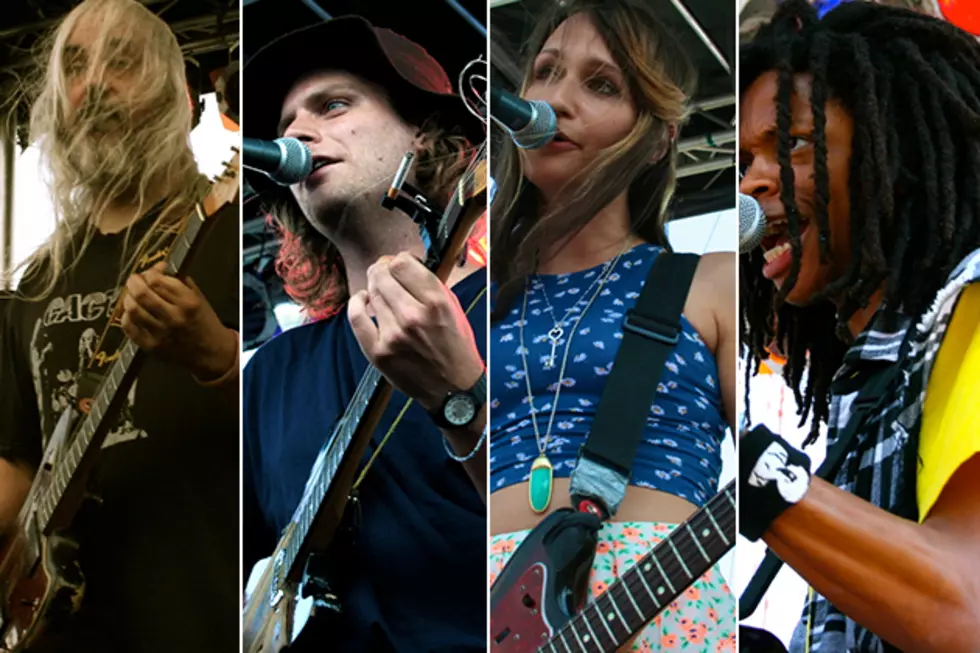
Those Darlins Dissect Songs and Reflect on Southern Roots – Exclusive Interview
Those Darlins stay close to their roots. While the Nashville rock band may lean less on "roots" and musical nostalgia than they did on their 2006 self-titled country-shuffle debut and its more hard-rocking 2011 follow-up 'Screws Get Loose,' they're sticking by the South – even when it isn't easy.
Like, for example, when Nashville briefly turned against them last year after they appeared nude on the cover of their 2013 album 'Blur the Line.' The creative core of Those Darlins, Jessi Zazu and Nikki Kvarnes, find themselves searching deeper into family matters and recovered memories in their songs these days, exposing their personal histories even as they smooth out their rootsier country, garage rock and girl-group influences into more straightforward sounds.
Those Darlins, which also includes drummer Linwood Regensberg and bassist Adrian Barrera, played at 4Knots Music Festival in NYC last weekend, and we caught up with Zazu and Kvarnes backstage and asked them about their revised approach to writing songs, their complicated feelings about Nashville and other things.
Was 'Blur The Line' an attempt to dig a little deeper creatively?
Nikki: Yeah, it was intentional to go deeper and show a little more of a vulnerable side of ourselves. Show a little bit more of our personalities. It came very naturally in the way it all kind of came together.
Was your songwriting process any different for it?
Nikki: Yeah. We pretty much wrote the songs separately, Jessi and me. On certain things we come together, but content-wise, we're very separate.
I wanted to ask about the song 'Oh God' from 'Blur the Line.' Lyrically, it's almost like a suite, because it has these three distinct parts – at the beginning, it's a reflection on family and parents, and then there's a section about being on the road, and then there's a section about being on the phone with someone, where they're moaning and saying, "Oh God, what have I done?" Where did that song come from, and how did it come to be what it was?
Jessi: Well, when I was writing the parts of the album that I wrote, I was doing a lot of journaling. In the past, I'd had a lot of songs that just came to me, or I'd sit down and just, "OK, I'm writing a song right now." This time, I did a lot more writing, writing, writing, and then looking back in the writing and going, "What's in there?" I'd notice that there were these certain things that would pop into my head, moments in my life that I'd get stuck on – things that happened a long time ago that were still bothering me. So I'd go and take those actual moments that were blocking me from what I wanted to write about and go on a tangent on them. I didn't mean to write ['Oh God'] as a song – I just ended up writing about this bad experience I had.
Did those moments end up being in the same song because they were linked thematically, or was there just the feeling that they belonged together?
Jessi: Yeah, I think there is definitely something that linked them thematically. I mean, I think part of what the question is always for me is, chasing a lifestyle of living on tour and being ... like, worn out. The touring lifestyle and the heartaches and pains that come with that. But also in my personal relationships with people that I seek out to be in a relationship with. I think where that all ties in together is, the question of like, is it intentional? Is it something that I'm drawing this stem from something that happened to me in a younger part of my life? Is it a chain of events that started with me, and with my parents, and with their parents and their parents? Where does dysfunction come from? Like, do I chase pain, almost, chase it down, you know?
I know in Nashville a lot of people were talking about the cover of that album, and it was all over the TV news there, because the cover was installed in the window of a record store there and people freaked out about it. Is the cover a metaphor for the music – a way of you sort of exposing yourselves?
Nikki: Mm-hmm.
Jessi: Yeah, pretty much. That was the intention.
Did you care that people didn't seem to get it?
Nikki: No, we didn't care that people didn't seem to get it. It's just a reflection of where people's heads are at – like, just because it's nudity, it's pornography and it's sex. Like, I can see sex in it, too, but I don't see that first. It's just what eyes you use. With us being in Nashville, too, most people are Christians, and that is pornography and it's disgusting and appalling, and that's just a very different reflection than I think what other people would perceive.
Jessi: I think also, our thing has always been –
Nikki: – nudity!
Jessi: [Laughs] No, in making art and music or whatever ... you know that some people are going to get it, and some people aren't.
Nikki: And it's kind of scary. It's like walking into a room naked. Even sometimes showing songs to each other, it's like, "OK, here's a song – I don't know what you're gonna think about it, don't judge me." It is really like exposing a part of yourself that even in being naked you couldn't expose. With vulnerability, there's also this strength, because you're like, "I'm able to be vulnerable, I have more strength than people who can't go there." So, all of us being nude together becomes a bigger strength.
Jessi: And the theme that brought a lot of the songs like 'Oh God' together was that we were trying to go deeper and put ourselves out there, making us more vulnerable but making ourselves stronger by doing it.
I know that if you had hung that album cover in a record store in Williamsburg, Brooklyn, you wouldn't have had any reaction to it at all.
Nikki: Oh yeah, we know that. [Laughs]
Jessi: That was part of it – we were like, We'll just see what happens here.
Nikki: We were like, "This is how our city reacts to it."
Jessi: This is the South, y'all.
Would you consider moving to a city where there were more bands that play the kind of music you play?
Nikki: I don't think that our location really would change what we sound like. We're southerners at heart, we grew up in the South and were raised in the South. It's something that will always stick with you – ask any Southerner. And it's probably the same with any region.
Jessi: I've always lived in the South. I've never lived anywhere else. I used to wanna move a lot, but now I don't have the interest so much. I like that friction.
Nikki: But I think about living in New York City, and I don't know what I'd do.
Your first record had a lot more rootsy and country influences, and the latest record doesn't have as much. Have you noticed your audience change?
Nikki: Yeah. There are always the old standbys, who will always be there.
Jessi: There are new people.
Nikki: There are people who say, "I don't really like that band anymore," and there are new people who don't really know what our past is, and love what we're doing now. I think our audience has changed a lot over the course of our band career, but, I mean, I like it. I think it's cool that we have a really broad audience.
Well, and you're able to play those songs next to the new ones and they don't sound too different.
Nikki: Yeah, some of them. Some of them from the first album we don't play. It was kind of a different band. It was pretty different.
Are you working on another record?
Nikki: We're working on working on one.
Are you going to continue the trajectory? The songwriting methods?
Nikki: Probably not. [Laughs] We're not very consistent with the way we do things. We just do it.
Jessi: We have to find something new to spark it.
Nikki: And with lineup changes, and we're at different parts in our lives, the process is just constantly changing. And inspired by different things. "Who knows?" is the answer.
Are there bands from Nashville we should check out?
Nikki: Our friend Adia is good. Adia Victoria. She's working on a record, she hasn't put out one yet. Music Band. Diarrhea Planet.
Jessi: Diarrhea Planet rules.
Nikki: We toured with them earlier this year, and we're touring with them again.
Jessi: Who else?
Nikki: Tristen. She reminds me of us – she started out doing country, folk-y stuff and went into pop stuff. Reminds me of really young Madonna. But more poetic and flowery. Maybe that's a terrible description.
Do you think that once you stop being a roots band or a country band anymore, that there's no way to go back?
Nikki: No, because we did that. If you're an artist, you can do whatever you want.
Jessi: It's about always going back to what you were, and feeding that into what you do now.
More From Diffuser.fm









